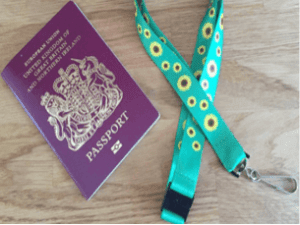January 20, 2018
We have had lots of good feedback on the Hidden Disabilities lanyard scheme at Guernsey and Alderney Airports. The scheme was launched on 1 December 2017. The lanyard will help staff discreetly identify travellers who may require support. Airport staff are ready to assist all travellers however wearing a lanyard will prompt staff to ask ‘how can I assist’. The lanyards are free and available from the Airport Information Desk, Health Information Guernsey, Wigwam, GDA, Guernsey Blind Association and other charities.
Other airports also using the Hidden Disabilities lanyard include: Manchester, Heathrow, Gatwick, London City, Edinburgh, Bristol, Birmingham and Belfast International.
Two workshops have recently been held, the first to solicit input on the possible scope, functions and remit of an Equality & Rights Organisation (ERO) which you can read more about in ‘Fairness for all: Developing Guernsey’s ERO’ in this Newsletter.
The second workshop looked at the next steps in promoting more positive and inclusive attitudes towards disability in the community. Although there is a lot of work going on in Guernsey about raising awareness there is still much more to do and this will be a focus during 2018 and onwards.
There is an exciting development to report on the disability discrimination legislation project. The Committee for Employment & Social Security has identified the need for some expert policy and legislative advice to help the Committee to select legislation from another jurisdiction on which to model our own disability discrimination/equality legislation. Following a competitive procurement process, the Committee is now very close to appointing a leading academic in the field to undertake this work during the first quarter of 2018. The next stage of the project will be to develop proposals for how best to tailor the model legislation to fit the Guernsey context and to address any issues identified with the operation or effectiveness of the law in that jurisdiction. The Committee intends to engage a specialist to assist with this work as well. It is hoped that utilising the experience and knowledge of experts in the field will help to accelerate progress on the project.

Following the release of the polymer £5 note, the new £10 note, released in September 2017, is the most accessible yet. It is larger than the new £5 note, but smaller than the current £10 note. The Bank of England worked closely with RNIB to build accessibility into the design of the new £10 note. The front of the note (which is the side with the raised point) has two clusters of raised dots embossed in the top left-hand corner to help blind and partially sighted people distinguish between notes more easily. The series of notes also include bold numerals, differing colours and tiered sizing to further help people with sight loss.

In line with the Supported Living and Ageing Well Strategy, the States is developing a Carers Action Plan. The plan will focus on the needs of people who care for or support family members and friends on an unpaid basis (referred to as ‘carers’), and will set out the improvements to the services and support that carers can expect, in order to better support carers to be able to fulfil their caring responsibilities and to participate fully in society. To inform the Carers Action Plan the States are currently seeking carers’ views on the services and support that they currently receive, or would like to receive in the future. We have put together a short survey which should take about 10 to 15 minutes to complete.
Anyone who carries out (or has carried out in the past) informal caring responsibilities, or works with or is closely involved with carers is invited to complete the survey which can be accessed through this link: https://www.surveymonkey.co.uk/rGZ7FQC9 or if you would prefer a paper copy, please email carers@gov.gg or phone 01481 732546. The deadline for providing survey responses is Wednesday 7 February 2018.
Caroline Mullins
Disability Officer
19 January 2018
